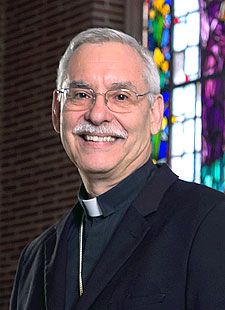
By Cian Molloy - 05 July, 2020
All lives matter, but society does not act that way — this is exactly the point of the Black Lives Matter movement said the Bishop of Little Rock, Dr Anthony Taylor, in a pre-July 4th message to his flock.
Bishop Anthony Taylor’s diocese covers the southern American state of Arkansas, which was part of the Confederacy that attempted to break away from the United States over the slavery issue in the 1860s. During the 1950s, the city of Little Rock became the focus of the civil rights movement, when the national guard was mobilised in order to escort a group of black school children, known as ‘the Little Rock Nine’, to their local secondary school, after the US Supreme Court ruled that America’s segregated education system was illegal.
During the last month, there have been increased tensions in Arkansas, and other parts of the United States, because of clashes between those who describe themselves as supporters of the Black Lives Matter (BLM) movement and those who see BLM as a threat.
Bishop Taylor opens his message by recalling the situation in one of his parishes, Sacred Heart in Oklahoma, where he was appointed parish priest in 2003. Despite the fact that the parish was 95% Hispanic, the weekend schedule of six Masses was split fifty-fifty with three Masses in English and three in Spanish. Despite the fact that Spanish language Masses were nearly always at capacity and the English language-masses were ‘less than half full’, the English language Masses were scheduled for the most favourable times on Sunday morning.
The bishop-to-be called a meeting and asked the English speakers what would happen if “the tables were turned and we had English speakers standing in the back, along the aisles and outside the front door and they realized that of course, we would adjust the Sunday schedule to provide more English Masses”. He said: “In that way, the eyes of these well-meaning people were opened to the hidden injustice embedded in our Sunday schedule.”
Since then this particular parish now has nine weekend Masses, seven in Spanish, one in English and one bilingual.

Bishop Anthony Taylor of Little Rock.
“When people know that they matter things begin to change,” Bishop Taylor said. “That is the contribution that the Black Lives Matter movement is offering to us today. All lives matter, of course, but as a society we don’t act that way — and that’s the point. There are injustices embedded in the way our society is structured to which we are often blind. Most of my Anglo parishioners were aware of the crowding at the Spanish Masses, but they didn’t think of it as a problem, indeed viewing it from outside, they spoke with admiration of the fervour of their fellow parishioners and were blind to the underlying injustice.”
Similarly, many white people are unaware of the disadvantages that come with being black, said the bishop who gave examples of the injustices suffered by people of colour.
Looking at American social tends, Bishop Taylor said the following disparities seemed very significant to him:
In his statement, the Bishop said: “If you and I are truly pro-life, we are obligated to work for the protection and respect for human life from the first moment of conception to natural death and every stage in between, and thus it is obvious that racism is a pro-life issue. Racism is a sin, and we have to admit that even as a Church, we have not been immune to racial bias and the blindness to structures of sin that affect how our own institutions are run.
“Of course, we condemn the acts that have led to the deaths of George Floyd and countless other people of color, but we are often blind to the other things described above that are part of our lives and continue to do harm.
“I hope this has helped you understand why it is so important for us to insist that Black Lives Matter and to view the task before us through the pro-life lens of our Christian belief in the God-given intrinsic dignity of every person, in this case Black people, rather than the more secular Marxist-inspired class struggle lens that some would propose and which sometimes gets disproportionate coverage in the news.”